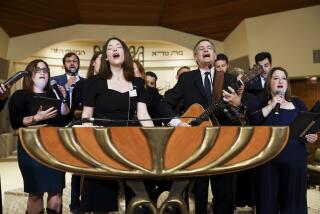Electronics Sales Surge as Hams Tune In to Gulf War
- Share via
With their appetite for news from the Persian Gulf unsatisfied, Orange County residents are depleting the supply of shortwave radios in local electronic stores.
“After waves of Scuds come in, so do the waves of people,” Ham Radio Outlet assistant manager Tom Nelson said Friday after running out of portable shortwave radios, books about international broadcast frequencies and antennas.
Before war broke out in the gulf, the store usually sold about three or four shortwave radios a week, Nelson said, but sales jumped to three or four a day last weekend.
Shortwave radios allow listeners to hear broadcasts from the British Broadcasting Corp. or from government-owned, high-powered radio stations from around the world, including Radio Baghdad. Shortwave radio owners can listen but cannot broadcast.
Licensed amateur radio operators--also known as hams--use more sophisticated shortwave radios and receivers to listen to the same radio bands but also to transmit messages.
Ham operator Art Enochson of Buena Park said Radio Baghdad offers entertaining listening but not many facts.
“It’s all propaganda,” he added.
One recent broadcaster, he said, spoke of “living in a wonderful country. We have everything at our disposal, even though we have enemies around this world that are making life miserable for us.”
Conversely, ham radio operators are seeing a lull in the action. Usually relied upon to reach distressed areas during earthquakes or other times of crisis to get information, the thousands of amateur radio operators in the United States have not been pressed into war service.
One reason is that instantaneous TV news coverage and operable telephone lines in the war region have allowed a wealth of information to flow from the Mideast, some hams said recently.
So good was the information on TV during the first few days of war, Newport Beach operator Ned Jacoby said, that nothing could be heard on the radios.
“All amateur bands were absolutely stopped” when war broke out, he said, because “everybody’s interest was just taken away by the television to the instant news.”
And no news comes from behind the imaginary curtain that separates Iraq and Kuwait from the rest of the world. The international crisis has silenced fellow hams in the war-torn countries--operators whose names and broadcast signals had become familiar to Orange County hams before missiles were fired.
“If you wait, sooner or later, someday, they will be there again,” Huntington Beach ham operator Steve Locks said of the Mideast hams who no longer broadcast, either because of orders by their governments, for security reasons or because of war fears.
Through the clatter of static and screeching radio frequency tones, the distant voices of radio operators in Israel sometimes come through. A rare transmission was heard early last week from Saudi Arabia.
And on Friday, Elfy Griffiths in the San Francisco Bay Area heard from her husband, Red, who is on a merchant ship in the Persian Gulf on its way to Abu Dhabi in United Arab Emirates. He passed along a list of phone numbers of crew members’ families, so that she can relay word that the relative is fine.
The last census of amateur radio operators showed 482,430 licenses in the United States, one in Iraq, 180 in Kuwait, 1,061 in Israel, two in Saudi Arabia and 157 in Jordan. One of those in Jordan belongs to King Hussein, who in quieter times conversed with U.S. hams.
And so the operators listen, hoping to maintain the goodwill that existed before the start of hostilities. Like fishermen, they drop a line and wait silently for a catch.
From his garage that is partly a storage area and laundry room but mostly his ham shack, Locks aimed his 55-foot antenna Monday night toward the North Pole and spun his tuner, hoping to pick up a signal from Ben, an Israeli radio friend who was last heard from Jan. 7.
Instead, he found Al in Venezuela.
Although politics and religion are considered taboo subjects on amateur radio, Locks asked him what he was hearing about the war. “Very bad situation, very bad situation, Mr. Steve,” Al responded. “Very crazy people in the world, huh?”
Suddenly, 13 time zones ahead of Southern California, a man identifying himself as Lev from the Soviet republic of Kazakh got on the air. Operators from all over the world scrambled to engage him in conversation, and Locks succeeded.
“Wonder if you listened to the news over there and if you heard anything in the last few hours on the Middle East?” Locks asked.
But Lev, apparently wanting to avoid politics, responded with a “QRZ,” meaning, “Who else is calling me?”
More to Read
Sign up for Essential California
The most important California stories and recommendations in your inbox every morning.
You may occasionally receive promotional content from the Los Angeles Times.













